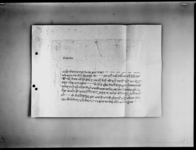A copy of a rukkā from King Rājendra reconfirming Pratāpanātha as priest of Śrī Ratannātha at Phalabang (VS 1884)
ID: K_0636_0013
Edited and
translated by Christof Zotter
Created: 2021-10-22;
Last modified: 2022-07-01
For the metadata of the document, click here
The accompanying edition, translation/synopsis and/or commentary are available under the terms of the Creative Commons Attribution-ShareAlike 4.0 International License
Abstract
In the rukkā of which the present document is a copy, the king, who according to the date must have been Rājendra, reconfirms Pratāpanātha as pūjārī of Śrī Ratannātha at Phalabang.Diplomatic edition
[1r]
1श्री\1श्रीरतन्नाथ1स्वस्तिश्रीमन्माहाराजाधिराजकस्यरुक्का•¯¯ ¯¯ ¯¯ ¯¯ ¯¯ ¯¯2आग्येप्रतापनाथजोगिकेफलावाङ्का¯ ¯ ¯ कापुजाहारिअघीदेखिकापनितिमिरह्या
3छौ•पछिवीचमापर्देसिजोगीरअमालीमीलीवर्षप्रतीपजनीगर्दाथानविग्रन
4उज्रनगएछ•आज•उप्रांत¯ ¯ ¯ कोविधिपूर्वकनीत्यनैमित्यकपूजागरंज्यालसम्मषो
5स्मोस्नगर्नुभनिवन्देजवाँधीवक्स्यौ़आफ्नाषातीरज्मासंग•तेसथांकागुठीमाद
6रिया़काजगाकोआम्दानीपैदाव़ारमुलुकमालाग्याकोदैदस्तुरषसोषास
7ली¯ ¯ ¯ कोनीत्यनैमित्तिकपूजाचलाईथानकोमर्मतगरिहाम्रोजये़मनाई•सेष
8रह्याकोभोग्येगर•इतिसंवत१८८४सालकार्त्तिकवदि१३रोज५सुभम¯ ¯ ¯¯ ¯¯
Translation
[1r]
Śrī Ratannātha
Hail. [This is] an executive order (rukkā) of the supreme king of great kings.
Āge: to Pratāpanātha Jogī
You resided as the pūjāhārī of [Śrī Ratannātha]1 of Phalabang (text: Phalābāṅ) also in an earlier time.2 Later, in the interim, foreign yogī(s?) together with amālī(s?) apparently spoiled and ruined the shrine by annually conducting a pajanī. We [hereby] fix the rule (bandeja) stating, "From today on, as long as [you] perform the regular and occasional worship according to the rules of [Śrī Ratannātha],3 [no one] shall seize [this privilege from you]." Take without reserve, conscious of your duty, the revenue [and] crop yield of the land registered under the guṭhī of that shrine [along with] the customary fees (daidastura) that accrue in [your] realm, manage the regular and occasional worship of [Śrī Ratannātha]4 , repair the shrine, celebrate our triumphs, [and] enjoy what remains [after covering the worship expenditures].
Thursday, the 13th of the dark fortnight of Kārttika, in the [Vikrama] era year 1884 (1827 CE).5 Auspiciousness.
Commentary
According to Naraharinātha's edition, the present rukkā was channelled through (mārphata) Prasāda Siṃha Basnyāt, Bhīmasena Thāpā, Dalabhañjana Pā̃ḍe, Bhaktavīra Thāpā and Raṇadhīra [Siṃha Basnyāt] (Naraharinātha VS 2022: 494).6 Pratāpanātha was succeeded in VS 1891 as pūjārī by his disciple (cf. Naraharinātha n.d.: 69) Brahmanātha (K_0013_0048A and K_0636_0012), who later on faced problems similar to ones his guru had with the foreign yogīs (see K_0008_0032A and K_0636_0010).7

